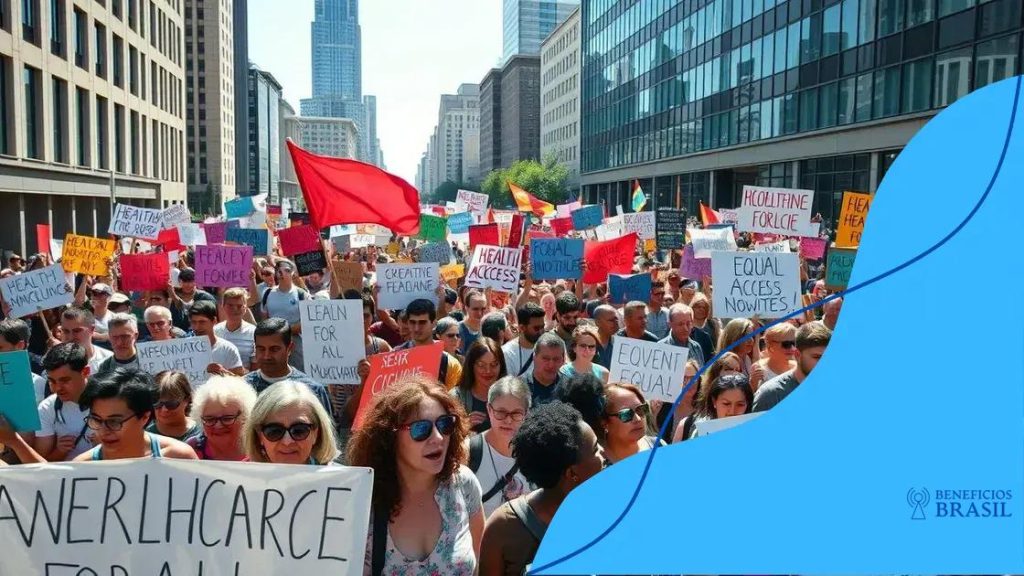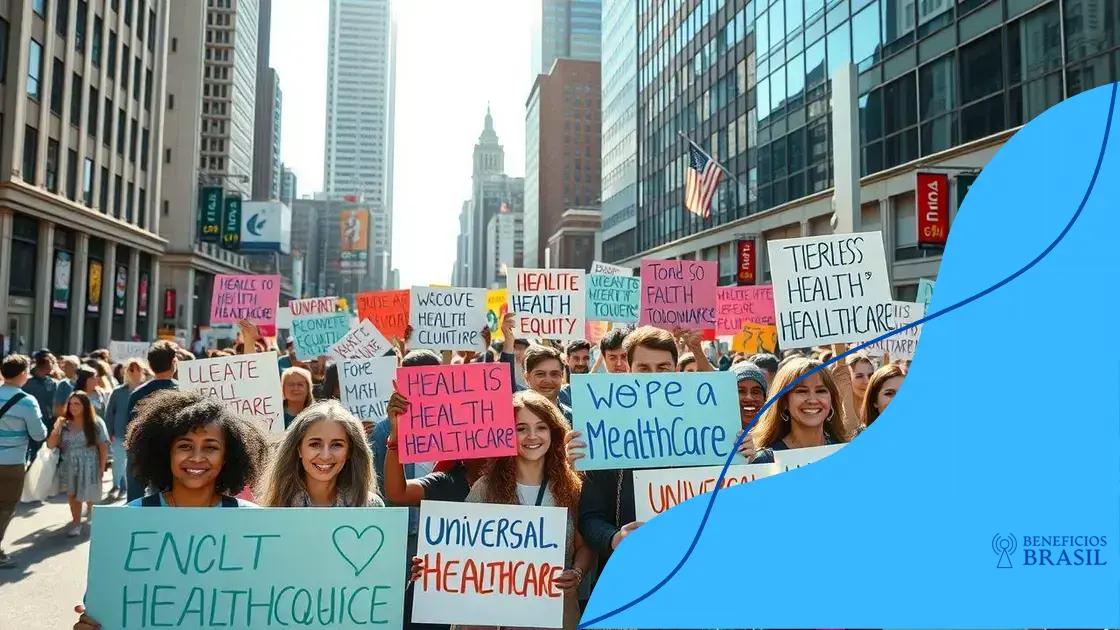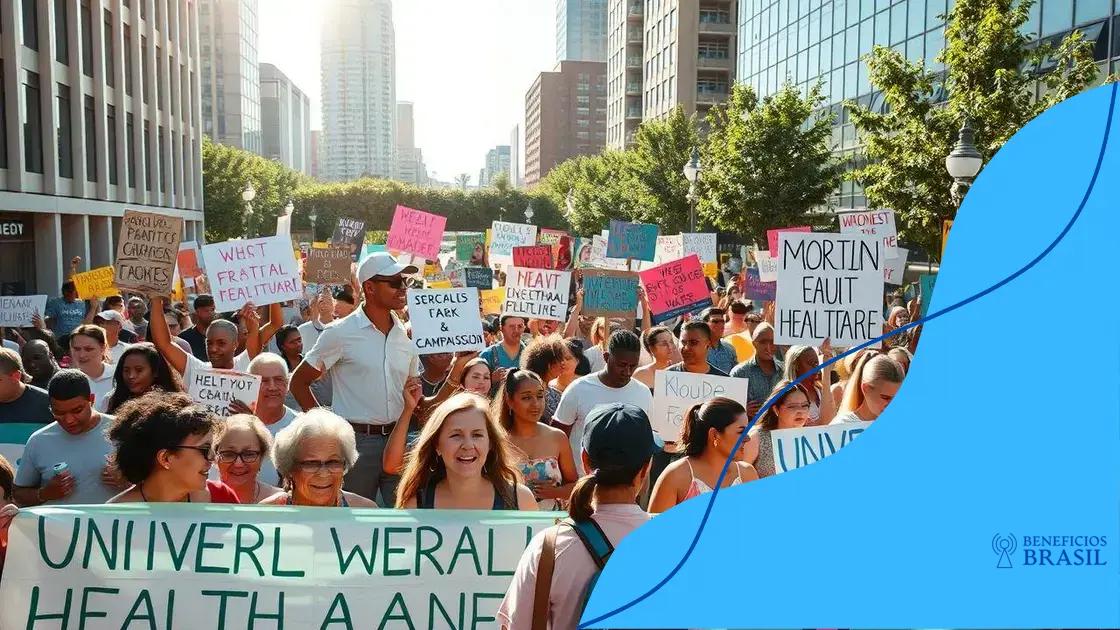Mass protests for universal healthcare access: a growing movement

Mass protests for universal healthcare access demand equitable health solutions, highlighting systemic inequalities and advocating for policy changes to ensure that everyone has access to affordable medical care.
Mass protests for universal healthcare access have been gaining momentum as citizens demand better health solutions. Have you noticed how these movements are shaping policies across nations? Let’s dive into what’s driving this urgent demand.
The rise of healthcare protests globally
The rise of healthcare protests globally reflects a growing dissatisfaction with current health systems. People around the world are demanding accessible and affordable health services. Recent events indicate that citizens are not only aware of their rights, but they are willing to fight for them.
Driving Forces Behind Protests
Several key factors motivate individuals to participate in these protests.
- High medical costs that many cannot afford
- Lack of access to essential treatments and medications
- Disparities in healthcare based on income or location
- Desire for greater government accountability
The emotional weight of these issues significantly impacts the public. When individuals cannot obtain necessary care, it creates a ripple effect that touches entire communities. This situation often ignites outrage, prompting citizens to join protests as a way of voicing their frustrations.
Global Movements in Action
Across continents, numerous movements highlight the demand for universal healthcare. Whether it’s in Europe, Asia, or the Americas, people are taking to the streets. In many cases, protests feature diverse crowds united by a common cause. They chant for change, share personal stories, and connect with others facing similar struggles.
During these demonstrations, one can often see creative displays of solidarity. Signs wielded by protestors succinctly convey their demands. Clear messages like “Healthcare is a human right” resonate deeply, fostering a sense of community among participants.
Such actions not only raise awareness but can lead to tangible policy changes. Governments are increasingly pressured to listen and respond. When citizens come together for a cause as vital as health, the power of their collective voice cannot be ignored.
Key reasons behind the demand for universal healthcare

Understanding the key reasons behind the demand for universal healthcare is essential in today’s world. Many individuals are increasingly vocal about their healthcare needs. This growing call for change stems from several pressing issues that affect people’s day-to-day lives.
Economic Factors
Many people find themselves struggling to afford medical care. This economic burden drives them to demand better healthcare options.
- Rising medical costs create financial strain on families.
- Insurance premiums are becoming less manageable.
- High out-of-pocket expenses discourage individuals from seeking treatment.
- Many are choosing between basic needs and medical care.
As financial pressures mount, the urgency for universal healthcare becomes more pronounced. Without a doubt, access to affordable medical services is seen as a fundamental right.
Social Justice and Equality
The fight for universal healthcare is also an issue of social justice. Many advocates believe that access to healthcare should not depend on where someone lives or their income level.
People are raising their voices against inequality in healthcare systems. This includes disparities in treatment based on race, gender, or socioeconomic status. Everyone deserves equal opportunities to receive quality care. When citizens unite under this cause, change can happen.
Public awareness campaigns, testimonials from patients, and personal stories significantly contribute to this movement. As more individuals share their experiences, the demand for security in healthcare practices strengthens. Witnessing others’ struggles often inspires collective action.
Furthermore, the ongoing global health crisis has highlighted the necessity for a robust healthcare system. Many are questioning the adequacy of current services in their communities. This scrutiny amplifies the appeal for comprehensive health solutions, ensuring everyone receives the care they need.
Impact of protests on health policy changes
The impact of protests on health policy changes is significant and often transformative. As more individuals take to the streets, their collective voices create waves that can alter governmental approaches to healthcare. These movements often serve as a catalyst for dialogue between citizens and policymakers.
Transformative Conversations
Protests encourage discussions that might not happen otherwise. When people gather to express their dissatisfaction, they shine a light on critical issues. Policymakers cannot ignore these clear calls for change. Often, protests highlight specific healthcare inadequacies that need urgent attention.
- Increased public awareness on health issues
- Protests can focus attention on necessary reforms
- Engagement with legislators who can influence policy
- Formation of alliances among various groups advocating for change
Such interactions can lead to drafting new policies, adjusting existing laws, and implementing reforms to address the highlighted concerns. These grassroots movements are crucial in advocating for the rights of individuals and creating an equitable health system.
Examples of Change
Historical instances show us how impactful protests have been in shaping health policies. For example, movements advocating for the right to healthcare have resulted in significant legislation in several countries. These developments often bridge the gap between healthcare access and social justice.
Moreover, protests can influence political figures to prioritize healthcare in their agendas. When voters demand health reforms, elected officials often respond by proposing legislation aimed at addressing those needs. The voices of the people become a powerful tool that drives legislative action.
Additionally, mass protests can lead to increased funding for healthcare programs. Allocating resources to these areas becomes a priority when the demand for change is loud and clear. Consequently, the public becomes more involved in advocating for their health rights, which ensures that healthcare remains a key topic in the political landscape.
Successful movements advocating for universal access

Many successful movements advocating for universal access have emerged, significantly impacting healthcare worldwide. These movements provide inspiration and demonstrate the power of collective action. Understanding their success stories can encourage others to join the fight for equitable healthcare.
Notable Movements
Among the most notable movements is the Medicare for All campaign in the United States. This movement seeks to implement a single-payer healthcare system that guarantees coverage for all citizens.
- The campaign gained traction through grassroots organizing and widespread public support.
- Social media played a crucial role in raising awareness and mobilizing supporters.
- Advocates often share personal stories that highlight the need for change.
- Political endorsements have also helped amplify this movement.
In Canada, the Medicare system is another significant example. It arose from sustained protests and advocacy that led to the establishment of publicly funded healthcare in the 1960s. This success proved that universal healthcare could work, inspiring other countries to pursue similar paths.
Many countries in Europe also showcase successful movements promoting universal healthcare. The continuous advocacy for policies that ensure everyone has access to healthcare without financial burden keeps these systems robust.
Lessons Learned
Several lessons emerge from these successful movements:
- Building strong coalitions enhances the chances for success.
- Continuous public engagement keeps the issue alive and relevant.
- Utilizing digital platforms helps to reach a broader audience.
- Inspiring personal stories resonate with people and motivate action.
These movements highlight that dedicated activism can lead to meaningful change. The journey towards universal healthcare may be long, but the examples of successful movements offer hope and direction for future efforts.
Challenges faced in achieving healthcare equity
Despite the growing demand for healthcare equity, significant challenges persist in achieving it. Various barriers hinder progress and complicate the efforts of advocates pushing for universal healthcare access.
Systemic Inequalities
One of the main challenges is the presence of systemic inequalities. These inequalities often manifest in different forms, affecting access to healthcare for marginalized communities.
- Socioeconomic status greatly influences healthcare access.
- Geographic location can limit availability of services.
- Discrimination based on race, gender, or sexuality is still prevalent.
- Lack of representation in healthcare leadership leads to oversight of critical issues.
Addressing these inequalities is crucial for establishing fair healthcare systems that cater to everyone.
Bureaucratic Barriers
Bureaucratic barriers also pose challenges to achieving health equity. Complex regulations and policies can delay or block necessary changes.
Healthcare organizations often struggle to navigate funding processes and compliance requirements. This can lead to insufficient resources to meet the needs of the communities they serve. Inefficient communication between various levels of government can further complicate efforts to implement change.
Public Awareness and Engagement
Another challenge is the limited public awareness surrounding the importance of healthcare equity. Many individuals may not fully understand the ramifications of unequal access to care. As a result, advocacy groups must continually educate the public and drive home the importance of these issues.
If citizens do not recognize healthcare equity as a vital concern, it diminishes the pressure on policymakers to act. Maintaining engagement and support is crucial for driving change at the legislative level.
Additionally, societal attitudes toward healthcare can be a barrier. Many people still view healthcare as a privilege rather than a right. This mindset can hinder the push for policies aimed at ensuring universal access and equity.
FAQ – Frequently Asked Questions about Universal Healthcare Access
What are the main challenges in achieving healthcare equity?
Challenges include systemic inequalities, bureaucratic barriers, and limited public awareness about the importance of equitable healthcare.
How can advocacy movements impact healthcare policy?
Advocacy movements raise awareness, engage the public, and pressure policymakers to address healthcare issues and implement necessary reforms.
What role do grassroots organizations play in healthcare equity?
Grassroots organizations mobilize communities, educate them on rights, and advocate for policies that promote universal access to healthcare.
How can individuals contribute to the fight for universal healthcare?
Individuals can contribute by raising awareness, participating in advocacy efforts, sharing personal stories, and supporting healthcare reforms.
